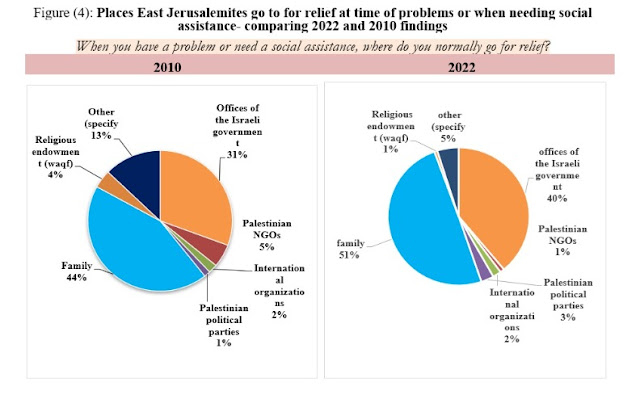Tuesday, February 21, 2023
 Tuesday, February 21, 2023
Tuesday, February 21, 2023 Elder of Ziyon
Elder of Ziyon
The Palestinian Center for Policy and Survey Research asked Arab residents of Jerusalem the same questions they asked in 2010, and their answers show that in general, things are much better for them than they were before.
And practically none of them trust Palestinian NGOs or the Waqf to help them.

For 21 out of 26 topics, the Arabs are more satisfied than they were in 2010, and in some cases significantly more. the biggest improvement was with the speed that fire and other emergency services arrive - satisfaction went up 28 percentage points from 42% to 70%, with a similar increase for satisfaction on ambulance service speed.
The poll also shows that things are much better for Jerusalemite Arabs in their standard of living, ease of travel through Ben Gurion Airport, the health system and even access to Al Aqsa Mosque and the Church of the Holy Sepulchre - things that you would not know from reading the news.
To be sure, there are plenty of things they are still unhappy with, and they are most dissatisfied with the difficulty of getting building permits.
There were other surprising results. When Jerusalem Arabs are asked to whom they turn to when they need help, most turn to family - but the Israeli authorities are not far behind.
Also, while most say they are fearful of intimidation by Jewish settler groups, there was a sharp increase of those saying they are more fearful of Palestinian groups intimidating them, from 20% to 29%.
Even though most of them are permanent residents of Jerusalem, 95% refuse to participate in municipal elections. But 92% say they would not vote in Palestinian elections, either.
If a two state solution would happen, more say they would prefer to become Palestinian citizens than Israeli citizens, but interestingly they also think that most other Arabs in their neighborhoods would prefer Israeli citizenship - which might reflect their real feelings. They had a laundry list of fears of how services and rights would be negatively affected by their neighborhoods falling under Palestinian control, from loss of freedom of speech to more corruption to worse health and municipal services.
It is an interesting survey, with no cookie-cutter results but rather a display of how complicated the issue is for the people who are most affected by any decisions on Jerusalem.

 Elder of Ziyon
Elder of Ziyon
























